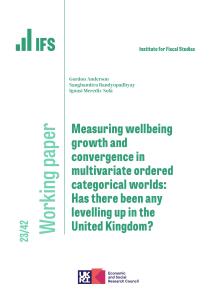There are few concerns older than that with inequality. Plato wrote that both extreme poverty and excessive wealth were productive of “great evil”, Plutarch that “an imbalance between rich and poor is the oldest and most fatal ailment of all republics”. The potential political power of the wealthy remains a huge issue in the most advanced democracies.
Philosophers, poets, playwrights and jurists have struggled with these issues for millennia. At least since the time of Adam Smith so have economists, with some gusto in more recent times as vastly increased amounts of data have allowed us to describe it, often in minute detail.
Not so long ago we seemed largely satisfied with concerning ourselves with looking at differences in incomes between rich and poor. More recently differences between old and young have moved up the agenda. Perhaps even they are being pushed aside by the new fashion for worrying about geographical differences, between the metropolis and the regions. For others, there is no inequality more pressing than that between the earnings of men and women.
Of course differences in life expectancy by social class or place of residence are endlessly fascinating. And if there is agreement on anything, it seems to be that social mobility really matters (though even that means different things to different people). Getting more of the middling classes into Oxbridge is not the same as giving those from the poorest backgrounds a decent chance of escaping poverty.
As for the causes of inequalities, the list is even longer. Parenting, education, inheritance, tax, welfare, trade, technology, globalisation, evil bosses, slothful workers — you name it, it has been fingered as the main culprit.
One word and such a vast array of meanings, such a range of issues. As a word, that makes it a powerful and dangerous weapon. In politics, it makes for easy rhetoric. It can lead to apparently easy, always partial and often ineffective or plain damaging solutions. Or it can lead to a kind of helplessness, that it’s all down to globalisation or things that go on within the family, things we may feel beyond the control of policy to influence.
We are not helpless. The way companies are run and the role of trade unions make a big difference. The German systems of education, collaboration between firms and workers and methods of corporate finance mean that globalisation has not wiped out their manufacturing base, nor led to such a big increase in inequality. Famously, the Scandinavians have a set of institutions that result in a relatively equal distribution of incomes. The British welfare state has been far more effective at combating rising inequality than has the American one. In the past two decades, increases in wage inequality have not translated into increased income inequality here because of our extensive system of benefits and tax credits. The reverse is true in the United States. Thankfully, we have not suffered the American opioid crisis and accompanying falls in life expectancy for some of those left behind by industrial change.
Around the world there is extensive evidence of the effectiveness of interventions to help poor families, deprived children and the unemployed. Yet our response has been, at best, inconsistent and piecemeal. Taxes on the rich were cut and have risen again. Tax credits for those on low incomes were introduced and expanded and then cut back. Focus on a university education for as many as possible is slowly and painfully being superseded by an acknowledgment that other parts of the post-school education system need to be expanded and improved. Sure Start grew and shrank. Where once the Conservatives were deeply opposed to any minimum wage, now they are presiding over dramatic increases in its level. Not so long ago senior Labour politicians were “intensely relaxed about people getting filthy rich”. No longer.
Some of this incoherence is, if not forgivable, at least understandable. The issues couldn’t be much more complex. Early years’ education is only really effective when followed up over long periods. Getting the right balance between tax credits and minimum wages is genuinely hard. Changing the way in which companies interact with schools and colleges, and creating systemic change to ensure that the less well-educated get valuable training, is harder still. Tackling health inequalities or lack of social mobility means tackling everything from work to housing to education to welfare in a way that is at least somewhat joined up. It should be obvious that there could be little more important for our political and social wellbeing than addressing these issues in a way that resonates with public concerns and is coherent and effective. Hard enough at the best of times; so much harder when Brexit is sucking the life and intellectual energy from everything else.
Well, it’s time to do something about it. If government won’t, then it’s up to those with the knowledge and expertise and concern for the public good to do so. Starting today, a group of the world’s leading social scientists, under the chairmanship of Sir Angus Deaton, Scottish-born Nobel Laureate and author of path-breaking work on the causes of inequality and on the opioid and health crisis in the US, will set out to help to fill this intellectual and policy void. Working with the Institute for Fiscal Studies and with political scientists, sociologists and epidemiologists and also drawing on the attitudes and experience of citizens, we aim over the next few years to do what social scientists should always be trying to do — to develop a comprehensive, intellectually coherent and politically deliverable agenda for action. Wish us luck.
This article was originally published in The Times and is reproduced here with full permission. Paul Johnson is director of the Institute for Fiscal Studies. Follow him on @PJTheEconomist.








